 "Your representative owes you, not his industry only, but his judgment; and he betrays instead of serving you if he sacrifices it to your opinion."
"Your representative owes you, not his industry only, but his judgment; and he betrays instead of serving you if he sacrifices it to your opinion."Edmund Burke
While Burke himself was Irish, his observations on the nature of representation and government have played an important role in the development of the American Republic.
From Wikipedia:
Edmund Burke (12 January 1729[1] – 9 July 1797) was an Irish statesman, author, orator, political theorist, and philosopher who, after relocating to England, served for many years in the House of Commons of the United Kingdom as a member of the Whig party. He is mainly remembered for his opposition to the French Revolution. It led to his becoming the leading figure within the conservative faction of the Whig party, which he dubbed the "Old Whigs", in opposition to the pro-French-Revolution "New Whigs" led by Charles James Fox. He is generally viewed as the philosophical founder of modern conservatism.[2]
Biographies of Burke
Wikipedia -
Stanford University
A Philosophical Enquiry into the Origin of our Ideas of the Sublime and Beautiful (1757)
Very difficult to read but worth trying to read some sections of it - (or fome fections of it -as the case may be - olf english often substituted f for s making the reading challenging)



